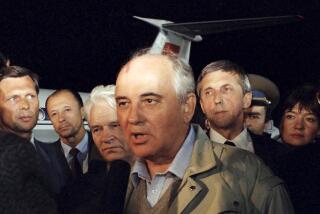Stalin’s oil minister guided Soviet Union’s economy
- Share via
Nikolai Baibakov, who was Josef Stalin’s oil commissar and later guided the Soviet Union’s planned economy for two decades, has died. He was 97.
Baibakov, believed to have been the last living commissar to serve under Stalin, died of pneumonia Monday in Moscow, Russia’s gas monopoly Gazprom said.
He also was thought to have been one of the last surviving witnesses of Soviet leader Nikita Khrushchev’s historic “secret speech” denouncing Stalin at the 1956 Soviet Communist Party congress.
Baibakov served as Russia’s deputy oil commissar during World War II. He was named Stalin’s oil commissioner in 1944 and fired in 1985 by the last Soviet leader, Mikhail Gorbachev, whose economic and social reforms preceded the Soviet collapse.
In 1942, Baibakov recalled in a 1998 interview, Stalin summoned him and told him he would be shot if the advancing Nazi army seized oil wells in Soviet Azerbaijan.
Stalin warned him that he also would be shot if, after the war, the wells couldn’t be returned to production, he said in the interview with Petroleum Economist magazine.
“If you leave at least a ton of oil to Germans, we will shoot you,” he quoted Stalin as saying. “But if the Germans don’t get there, and we will be unable to restart the production, we will shoot you too.”
Baibakov fulfilled both orders, surviving to launch the Soviet Union’s postwar development of oil and gas deposits in Siberia. He pushed for massive investment in the industry that became the backbone of Soviet Union’s planned economy and the foundation for post-Soviet Russia’s booming economy.
In 1965, Baibakov was appointed head of Gosplan, the huge Soviet central planning agency that set production quotas and investment levels for industry and agriculture. In that job, which he had filled briefly a decade earlier, he was expected to ensure that the so-called worker’s paradise delivered on its economic promises.
As the top planner, he helped boost industrial production but failed to revive farm production, forcing the Kremlin to buy wheat from the United States and Canada and weakening the Soviet Union’s position in the Cold War.
“The Soviet economy that was formed in the 1960s, 1970s and, partly, the 1980s was Baibakov’s creation,” said Andrey Nechayev, Russia’s former economic minister.
In Baibakov’s role as chief architect of Russia’s economy at Gosplan, he and his staff tried to replace the forces of the free market by allocating investment and setting production quotas to anticipate demand. He also struggled to control Soviet military spending as Moscow engaged in an arms race with Washington. Gorbachev fired Baibakov in 1985, at the dawn of perestroika, after Baibakov resisted efforts to reform the Soviet economy.
Baibakov was born in 1911 into an oil driller’s family in Baku, the capital of Azerbaijan. He served in the Red Army and worked as an oil engineer.
In 1963, he received the medal of the Hero of Socialist Labor, the Soviet Union’s highest civilian award, and a passenger ship was named after him in 1995 -- a privilege reserved for the most respected Soviet leaders.
Baibakov is survived by his wife and two children.
More to Read
Sign up for Essential California
The most important California stories and recommendations in your inbox every morning.
You may occasionally receive promotional content from the Los Angeles Times.











